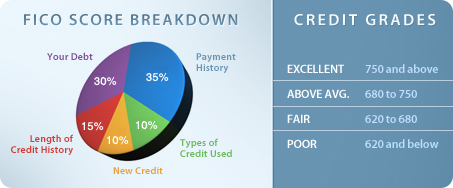7 Tips That Can Help You Increase Your Credit Score.
1. Dispute Errors and Inaccuracies
Recent studies show that as many as 80% of consumer credit files contain
errors and inaccuracies. Chances are you might be 1 of those 80. Errors
and inaccuracies, especially ones that are negatively impacting your
credit scores, can lead to higher interest rates on loans and credit
cards or denials for new credit. After you’ve obtained a copy of your
credit reports review them carefully to identify any items that are
negatively impacting your credit score and highlight everything you
believe to be incorrect, inaccurate, errors or obsolete and using a credit repair software
dispute those items. These could be inaccurate or outdated accounts,
unauthorized inquiries, collection that are not yours, duplicate
derogatory accounts and outdated or unknown public records and accounts
listed as “settled,” “paid derogatory”, “paid charge-off’” or anything
other than “current” or “paid as agreed” if you had in fact paid on time
and in full.
2. Make Payments on Time
One of the most important things you can do to have a high credit score
is to pay your payments on time. Since your payment history alone makes
up the 35% of your credit score making your payments on time is
critical. Late payments that are 30 days or more past due will have a
negative effect on your overall credit score. Late payments stay on your
credit reports for seven (7) years.
3. Make Sure All Your Credit Lines Are Posted On Your Credit Report
Often, some creditors will not post your credit line on your credit
report either by a human error or due to some other mistakes. Showing
less available credit will result in a lower credit score. If you notice
accounts that you have are not showing up on your credit report, you
can request the credit bureau to report these accounts. Also, If there
are past bankruptcies that are closed and should show up with zero
balance make sure to they show a zero balance! In many cases, you need
to file a dispute to request that the creditor reports the “bankruptcy
as a charge off as a zero balance.
4. Pay Down Debt and Don’t Max Out Your Credit Cards.
The second largest factor impacting your credit score is how much you
owe. This accounts for 30% of your score. The more you owe, the lower
your score will be. Someone who owes $30,000 is riskier than someone who
owes only $1000, all else being equal. So a great way to increase your
credit score is to pay down as much debt as you can. Another factor in
the credit score formula is your debt to credit ratio which should not
exceed 60% of your total available credit.
5. Keep Old Positive Accounts Open
Length of credit history is another important credit score factor, so it
can be to your advantage to keep open older accounts that are in good
standing. While it is important to keep the total number of open
accounts manageable, it may be more hurtful to your score to close an
old account than to keep it open even though it increases the number of
open accounts.
6. Keep Revolving Accounts Open
It is very helpful that you maintain a variety of credit accounts. If
you do not have four active credit cards, you might want to open some.
If you have poor credit and are not approved for a typical credit card,
you might want to set up a “secured credit card” account. A secured
credit card requires you to make a deposit that is equal to or more than
your limit. This guarantees the bank that you will repay the loan and
is an excellent way to establish credit.
7. Use Caution When Applying for New Credit.
Every time you apply for a credit card, line of credit, or other loans,
an inquiry is made to your credit report. While new credit is the least
important factor in your score, it is still an important issue to
consider. When you are shopping for a new loan or credit card, do your
shopping in a relatively short period of time. So to avoid these
inquiries, apply for new credit only if you must.
Understand What Affects Your Credit Score

| 330 – 619 | Poor Credit. |
| 620 – 659 | Sub-prime financing will be available to you. |
| 660 – 720 | Prime financing will be available to you. |
| 721 – 750 | Good Credit |
| 751+ | Excellent Credit |
FICO Credit Score Breakdown
The Exact Calculations Of The FICO Credit Score Are Kept Secret As Proprietary Information, But There Are Some General Guidelines That Can Apply
| 35% | of your credit score is based on your timely payment history and takes into account payments that are paid on time in less than 30 days past due. |
| 30% | is based on the credit usage also called a debt to credit ration; i.e., the ratio of current credit debt in comparison to total available revolving credit. Higher debt to credit ratio increases the chances of a payment default. Keeping a low balance on your revolving credit lines results in higher credit score vs having maxed out credit cards. |
| 15% | of your score is determined based on the length of your credit history. |
| 10% | is based on types of credit you have.; i.e., car loans, credit cards, mortgages and personal lines of credit. |
| 10% | is based on inquiries within last six months. When you apply for credit an inquiry is placed on your credit report by the creditor and that affects your credit score negatively. Pulling your own credit has no effect on your credit score – its called a soft pull and doesn’t affect your credit score. |
Categories
Recent Posts
GET MORE INFORMATION

Agent | License ID: 378859



